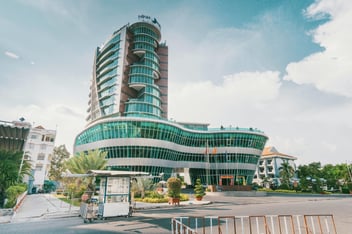Explore the latest trends and growth projections for the global hotel industry in 2024-2025, focusing on sustainability, technology, and personalized experiences.
The global hotel industry is set for a major rebound in 2024 and 2025, moving past the impacts of the COVID-19 pandemic into a period of growth and innovation. This blog post explores the emerging trends, market dynamics, and strategic opportunities that are set to redefine the future of hospitality.
Hotel Market Overview: A Resilient Rebound
The Dawn of a New Era: Global Hotel Industry Set for Remarkable Recovery in 2024
The global hospitality market is on track for remarkable expansion in the next three years, projected to reach USD 1,063 billion by 2028. This surge, reflecting a compound annual growth rate (CAGR) of 10.24% since 2022, is fueled by a confluence of factors: heightened travel demand, increased disposable incomes, and a robust resurgence in both business and leisure travel.
A notable hotspot in this global upswing is Southeast Asia. Nations like India and Thailand are spearheading the region's economic revival through significant investments in hotel infrastructure. These strategic efforts aim to meet the burgeoning influx of tourists and business travelers.
The focus on enhancing accommodation capacity highlights the region's proactive approach to leveraging the boom in the travel and tourism sector, positioning Southeast Asia as a pivotal player in the global hospitality industry.
Sneak Peek: Hotel Industry Trends 2024 Report
Get ready to dive into a wealth of knowledge about the future of the hotel industry with our Hotel Industry Trends Report.
Hotel Industry Trends
Discover the trends that will shape the international hotel industry in the coming years.
Inside our Hotel Industry Trends 2024 report, you'll find:
- In-Depth Market Analysis: Explore detailed projections and the factors driving growth in the global hospitality sector.
- Latest Trends: Discover the cutting-edge innovations and strategies reshaping the industry.
- Regional Insights: Detailed reports on key markets and regions poised for significant growth.
- Expert Forecasts: Gain perspectives from industry leaders on future developments and challenges.
- Practical Strategies: Learn actionable tips and best practices to elevate your hotel's performance and guest experience.
Southeast Asia's Hotel Industry Promising Future |
|
Southeast Asia is leading the charge in the hospitality industry's recovery, setting a robust growth trajectory for the region. An impressive 77% of hotels in the Asia-Pacific region, with a significant concentration in Southeast Asia, are projecting higher occupancy levels for 2024. This optimism underscores the region's pivotal role in the industry's rebound. Key markets such as Bali, Phuket, and Singapore are witnessing remarkable performance metrics, with Average Daily Rates (ADRs) soaring over 20% above pre-pandemic levels. This surge is largely driven by a revival in leisure tourism, as travelers flock back to these popular destinations. To sustain this momentum, flexibility and strategic adaptation are paramount for operators. High-growth markets like Japan and Korea exemplify the need for agile responses to the evolving tourism landscape. By embracing innovative strategies and catering to the diverse needs of travelers, the hospitality sector in Southeast Asia is well-positioned to capitalize on the ongoing tourism boom and solidify its recovery. |
“With changing guest preferences and increased competition, owners should take the opportunity to critically look at their concept and positioning, rethink their market segmentation, evolve their approach to attracting and retaining talent, and commit to a clear sustainability pathway,” says Xander Nijnens, head of advisory & asset management, Asia-Pacific, JLL.
10 Trends for the Hotel Industry 2024 - 2025
1. Sustainability and Green Practices
As environmental concerns intensify, specially among younger guests, hotels are increasingly adopting sustainable practices to meet growing demands for eco-friendliness. Eco-friendly designs, energy-efficient systems, and waste reduction programs are becoming industry standards. Technologies such as smart thermostats, LED lighting, and water-saving fixtures are now widely implemented.
Hotels are also making significant strides in reducing single-use plastics and sourcing locally produced food. Certifications like LEED (Leadership in Energy and Environmental Design) not only help hotels meet customer expectations but also provide a competitive edge.
2. Technology Integration
The integration of technology into daily processes is transforming the hotel industry, making operations more efficient and guest experiences more personalized. Artificial intelligence (AI) and automation tools are at the forefront of this transformation.
Also playing a major role are IoT devices, which enable a highly personalized stay, allowing guests to control room temperatures, lighting, and even entertainment preferences through smart systems. AI-powered chatbots provide virtual concierge services, addressing guest inquiries and requests promptly and efficiently.
Moreover, digital technologies such as contactless check-in, mobile keys, and guest messaging systems are streamlining processes, reducing the need for physical contact, and enhancing overall operational efficiency.
Hotel Industry Trends
Discover the trends that will shape the international hotel industry in the coming years.
3. Wellness and Health-Focused Amenities
Hotels are broadening their wellness offerings beyond traditional spas to include fitness programs, mental health retreats, and holistic health services. This trend reflects a growing movement towards health-conscious travel and a rising demand for wellness and personal care tourism.
4. Experiential and Immersive Travel
Guests are increasingly seeking unique and immersive experiences. In response, hotels are offering local cultural activities, adventure tourism packages, and personalized experiences that create memorable stays.
Emphasizing connections with local culture and the environment is reshaping hotel services and activities.
5. Food and Beverage Innovation
A shift towards plant-based and health-conscious food options is emerging in hotels. Additionally, hotels are exploring ghost kitchens and high-quality takeaway services to cater to evolving dining preferences.
This trend mirrors a broader movement towards sustainable and health-conscious eating habits among travelers.
6. "Workation" Accommodations
With the rise of remote work, hotels are now providing co-working spaces, high-speed internet, and extended stay packages. This trend, known as "workations," allows guests to seamlessly blend work and leisure during their stay, creating a productive yet enjoyable environment.
7. Enhanced Cleanliness and Safety Protocols
In response to the COVID-19 pandemic, hotels have adopted stringent cleaning and safety measures. These include contactless services, advanced cleaning practices, and health certifications, all designed to reassure guests. Emphasizing cleanliness and safety has become a crucial factor in attracting and retaining guests in the post-pandemic era.
8. Personalized Services and Experiences
Hotel chains are increasingly focusing on offering personalized services and guest experiences tailored to individual guest preferences. This can range from customized room settings and personalized dining experiences to bespoke travel itineraries.
Such personalization is vital in enhancing guest satisfaction and fostering loyalty.
9. Focus on Local Culture and Experiences
To cater to travelers seeking authentic experiences, hotel chains are partnering with local businesses and offering activities that highlight local heritage and attractions. By emphasizing local culture, hotels can differentiate themselves and provide guests with unique and memorable stays.
10. Bundled Packages and Upselling
To maximize revenue, hotels are offering bundled packages that combine accommodation, dining, and recreational activities. Additionally, upselling strategies, such as offering upgrades and add-ons during booking and check-in, provide guests with convenience and added value, encouraging longer stays and increased spending.
Hotel Industry: Challenges and Opportunities
Addressing Staffing Shortages
The hospitality sector continues to recover from significant job losses incurred during the pandemic. To attract and retain talent, hotels are offering improved wages, benefits, and career development opportunities. The rise of automation and experience-based roles adds complexity to the task of securing the right talent for the industry.
Exploring Investment Opportunities
Emerging markets, especially in South Asia and Latin America, present substantial potential for leisure and business travel developments. Investing in technology and sustainable practices provides significant opportunities for growth and differentiation in the highly competitive hotel market.
Tackling Online Booking Challenges
Online booking issues remain a considerable hurdle for the hospitality market's growth. Upgrading IT infrastructure to prevent errors and ensure seamless operation is crucial for overcoming these challenges.
Meeting New Customer Expectations
Technological advancements have drastically changed consumer habits, with customers now expecting more personalized and immediate experiences. To meet these heightened expectations, hotels must prioritize customer-centric strategies.
Managing Rising Costs
The hotel industry is grappling with increasing costs for goods, consumables, and energy, which impact profit margins. Hotels must adapt their commercial strategies to market trends, implement risk control models, and renegotiate supplier prices to manage costs effectively.
Staying Ahead of Increased Competition
The digital landscape has introduced new companies and business models that directly compete with traditional hotel companies. Platforms like Airbnb and the growing number of private accommodations pose a threat to hotel chains, necessitating innovation and differentiation strategies to remain competitive.
Conclusion
The global hotel industry is on a steady path towards growth, driven by emerging trends such as personalized experiences, technology integration, sustainable tourism, and immersive travel. Embracing these trends will guide hotel chains towards growth, differentiation, and leadership, building the foundation for staying competitive in a rapidly evolving market.
For a deeper dive into the future of the hotel industry, download our comprehensive report that explores these trends in greater detail and provides actionable insights for industry stakeholders.
Download Now!
Hotel Industry Trends
Discover the trends that will shape the international hotel industry in the coming years.
By leveraging the insights and strategies outlined in our report, hotel operators and investors can navigate the evolving landscape, capitalize on emerging opportunities, and drive sustained success in the years ahead. Don't miss out on the chance to stay ahead of the curve in the dynamic world of hospitality.



